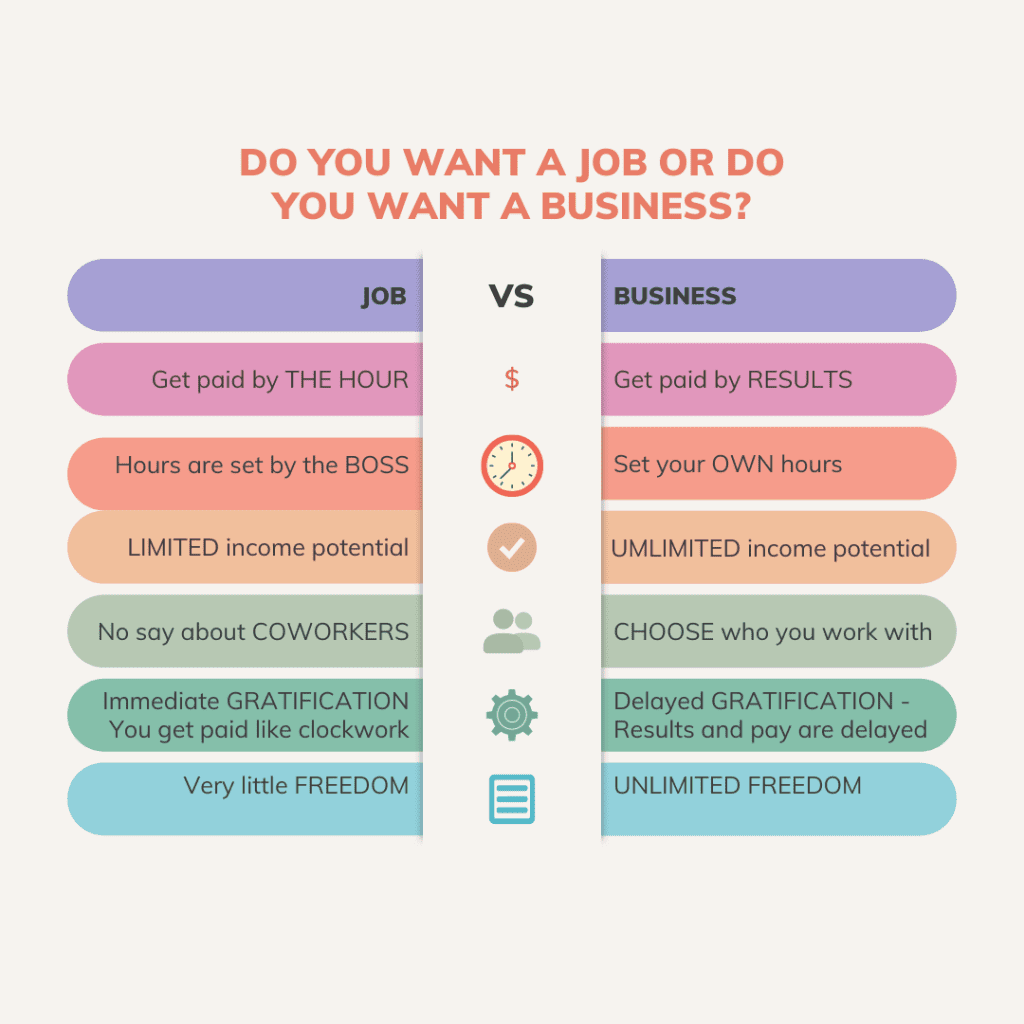Beyond the Paycheck - Business vs Job - Which Path Suits You?

Understanding the Fundamentals
When considering the path to financial stability and personal fulfillment, it's essential to understand the fundamental differences between having a job and running a business. While both provide income, they differ significantly in terms of purpose, potential, and financial independence.
The Nature of a Job
A job is a temporary position with an employer, offering a fixed salary or wages. It provides stability, security, and benefits, but often comes with limitations on creativity, autonomy, and growth. A job typically requires:
- Trading time for money
- Following established procedures and protocols
- Reporting to a supervisor or manager
- Limited decision-making authority
- Predetermined salary or wages
The Essence of a Business
A business, on the other hand, is a commercial or industrial organization engaged in producing goods or services, seeking profits. Entrepreneurship offers the potential for:
- Unlimited earning potential
- Creativity and innovation
- Autonomy and decision-making authority
- Personal fulfillment and legacy
- Financial independence
The Key Differences
The primary difference between a job and a business lies in their purpose and potential for financial independence. A job provides stability, while a business offers scalability. Understanding these differences is crucial in choosing the path that suits your goals, risk tolerance, and personality.
While a job offers predictability, a business presents uncertainty and risk. However, for those willing to take the leap, entrepreneurship can lead to unparalleled rewards and personal growth.
Key Differences Between Jobs and Businesses
When considering whether to opt for a job or venture into business, understanding the fundamental differences between the two is crucial. Here are some key distinctions to help you decide which path aligns with your goals and aspirations.
1. Profit Sharing
In a job, your compensation is limited to your salary or wages. You don't receive profit shares, regardless of the company's performance. In contrast, as a business owner, you reap the benefits of your hard work and dedication. Your earnings directly correlate with your business's success, providing unlimited growth potential.
2. Risk Factor
Jobs offer stability and security, with a fixed income and benefits. Businesses, on the other hand, come with inherent risks, including potential financial losses. As an entrepreneur, you'll face challenges, uncertainties, and setbacks, but also enjoy the thrill of overcoming obstacles and achieving success.
3. Vision and Motivation
In a job, you work towards your employer's vision and objectives. While this can be fulfilling, it may not align with your personal goals. In a business, you pursue your own vision, driven by your passions and values. This autonomy allows you to create something meaningful and lasting.
4. Reward System
Jobs offer bonuses, rewards, and promotions based on performance. While these incentives can motivate, they may not fully satisfy your entrepreneurial spirit. Businesses motivate through success and growth, providing a sense of accomplishment and pride in your creation. Every milestone achieved serves as a reward, driving you to push boundaries and innovate.
Considering these differences will help you decide whether the stability of a job or the thrill of entrepreneurship suits you best. Ask yourself:
- Are you content with a fixed income or do you crave unlimited earning potential?
- Can you handle uncertainty and risk or do you prefer stability?
- Do you want to pursue your own vision or contribute to someone else's?
- What drives you: bonuses and promotions or the freedom to innovate?
Reflecting on these questions will guide you toward the path that aligns with your strengths, aspirations, and values.
Weighing the Pros and Cons
When deciding between pursuing a job or starting a business, it's essential to consider the advantages and disadvantages of each path. Both options have their unique benefits and drawbacks, which can significantly impact your personal and professional life.
Job Security and Stability
Jobs provide stability, benefits, and structured growth paths. A steady paycheck, paid time off, and access to health insurance are just a few benefits that come with being employed. Additionally, jobs often offer:
- A clear hierarchy and career progression
- Opportunities for skill development and training
- A sense of security and predictability
- Less financial risk compared to entrepreneurship
The Allure of Entrepreneurship
Businesses, on the other hand, offer unlimited earning potential, decision-making autonomy, and personal satisfaction. As an entrepreneur, you have the freedom to:
- Pursue your passion and create something meaningful
- Make decisions that align with your vision and values
- Scale your income as your business grows
- Innovate and bring new ideas to market
Making an Informed Decision
Consider your risk tolerance, financial situation, and long-term goals when choosing between a job and a business. Ask yourself:
- Can I afford the financial uncertainty of starting a business?
- Do I have the skills and expertise to succeed as an entrepreneur?
- Am I willing to take calculated risks and adapt to challenges?
- Do my personal values align with the demands of entrepreneurship?
Ultimately, the decision between a job and a business depends on your individual circumstances, priorities, and aspirations. By carefully weighing the pros and cons, you can make an informed choice that sets you on the path to success and fulfillment.
Making an Informed Decision
Choosing between starting a business and opting for a traditional job is a pivotal decision that requires careful consideration. To make an informed choice, it's essential to evaluate several critical factors.
Self-Assessment: Skills, Interests, and Resources
Before diving into entrepreneurship, take an honest assessment of your skills, interests, and resources. Ask yourself:
- What are my strengths and weaknesses?
- What activities do I enjoy and excel at?
- Do I possess the necessary skills to launch and run a successful business?
- What financial resources do I have access to?
- Do I have a support network to help me navigate challenges?
Understanding your skills, passions, and resources will help you determine if entrepreneurship is the right fit for you.
Market Research: Demand, Competition, and Revenue
Thorough market research is crucial to determine the viability of your business idea. Consider:
- Is there a demand for your product or service?
- Who are your potential customers, and what are their needs?
- What competition exists, and how will you differentiate yourself?
- What revenue streams can you tap into?
- What are the market trends and growth prospects?
Conducting market research will help you validate your business idea and create a solid foundation for success.
Seeking Guidance: Mentors and Professionals
Seeking guidance from experienced mentors or professionals in your desired field can provide invaluable insights. They can:
- Offer advice on industry-specific challenges and opportunities
- Share their experiences and lessons learned
- Introduce you to key players and networks
- Help refine your business plan and strategy
- Provide encouragement and support during critical phases
Don't be afraid to seek help; mentorship can significantly increase your chances of success.
By carefully evaluating these factors, you'll be well-equipped to make an informed decision about whether starting a business or pursuing a traditional job is the right path for you.
Conclusion: Choosing Your Path
As we conclude our exploration of the age-old debate between pursuing a job or building a business, it's essential to recognize that there's no one-size-fits-all solution. The decision ultimately hinges on individual circumstances, priorities, and values.
Reflecting on Your Priorities
Ultimately, the decision between a job and a business depends on individual circumstances and priorities. Consider what matters most to you: stability and security, creative freedom, or financial potential? Your priorities will serve as the guiding force in making this critical decision.
Evaluating Your Strengths and Weaknesses
To make an informed choice, evaluate your strengths, weaknesses, and goals. Ask yourself:
- What are my skills and areas of expertise?
- Where do I struggle, and how can I improve?
- What are my short-term and long-term objectives?
- How do my values align with my career choices?
The Common Denominator: Dedication and Resilience
Remember, success in both jobs and businesses requires dedication, hard work, and resilience. Whether you opt for the stability of a job or the uncertainty of entrepreneurship, you'll face challenges and setbacks. Developing a growth mindset and cultivating perseverance will serve you well on either path.
In the end, choosing between a job and a business is not just about the money; it's about aligning your professional life with your passions, values, and goals. Take the time to reflect on your priorities, evaluate your strengths and weaknesses, and embark on the journey that truly suits you.















Comments ()